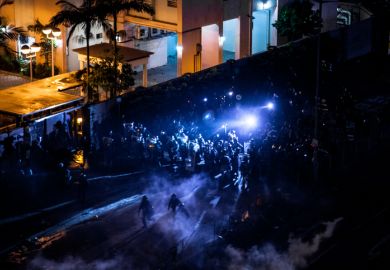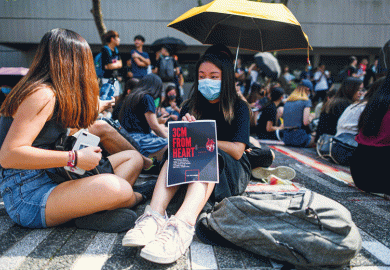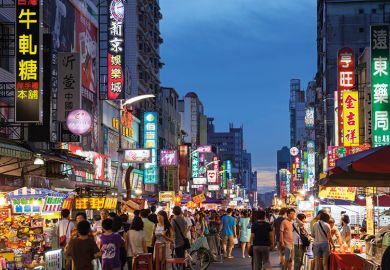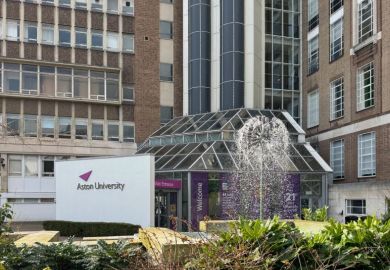Taiwanese universities have been hit by a wave of vandalism and campus unrest as tensions between mainland Chinese and Hong Kong students hit new heights.
About a dozen Taiwan universities have been affected by conflicts, often at “Lennon walls”, which are colourful displays of sticky notes and posters that feature political comments.
Pro-democracy protests in Hong Kong have spurred clashes on campuses all over the world, from Canada to New Zealand, but perhaps nowhere are tensions as high as they are in Taiwan, given its unique history as a self-governed island that China claims as its own. There has long been synergy between the Hong Kong and Taiwan youth protest movements.
This month, Taiwan’s president, Tsai Ing-wen, ordered government agencies to impose restrictions on visitors who damaged displays or attacked Hong Kong supporters. The education minister, Pan Wen-chung, called for mainland Chinese students in Taiwan “to cherish freedom of speech and refrain from violence or targeting other students”. Also this month, Taiwan carried out its first deportation linked to the Hong Kong protests by imposing a five-year ban on a mainland Chinese visitor who tore down posters on a Lennon wall at National Taiwan University.
Chia-Ming Hsueh, an assistant research professor at National Cheng Kung University, told Times Higher Education that debate on Taiwanese campuses had been even-tempered and rational and that clashes had “not been common”.
“Most students have been able to demonstrate a high degree of self-control in discussing this topic,” said Dr Hsueh, who specialises in international education. “Lennon walls can be seen at several universities to express students’ opinions, whether they were supporting or against Hong Kong issues. However, there were a few radical mainland Chinese tourists and students who vandalised the walls in order to show their anger and dissatisfaction.”
In September, a mainland Chinese student at I-Shou University allegedly tried to choke a Hong Kong student over a sticky note that read “Today Hong Kong, tomorrow Taiwan”, while a separate scuffle broke out at a Lennon wall at Chinese Culture University, sending one student to hospital.
There are concerns that Taiwan’s diplomatic and political isolation could harm its higher education sector, particularly after Beijing halved the number of mainland students allowed to study in Taiwan. The number of mainland students fell from more than 40,000 in 2016 to below 30,000 in 2018, according to Taiwan’s Mainland Affairs Council. But even with that decline, mainland Chinese students make up the largest group of non-local students, dwarfing Hong Kong students, who number less than 9,000.
Bi-yu Chang, deputy director of the Centre of Taiwan Studies at SOAS, University of London, told THE that the relationship between Taiwan and China made campus conflicts particularly contentious.
“Chinese students damaged Lennon walls on some campuses and claimed to exercise ‘democratic protests’. However, what is democracy?” she said. “These Chinese students seemed to form a different idea about what democracy is, how it operates, and the rights and responsibilities it entails. What they saw and then practised in Taiwan are superficial ‘democratic acts’. To me, their actions indicate a collective identity anxiety and a distorted vision of democracy.”
Dr Hsueh felt that Taiwan universities would preserve their freedom of expression. “For most universities in Taiwan, I believe, it’s very clear that freedom of speech shall be guaranteed,” he said. “It’s even more important to realise that a university should have the responsibility to maintain a rational space encompassing different voices and to educate its students to respect others no matter what their political stances are.”
Register to continue
Why register?
- Registration is free and only takes a moment
- Once registered, you can read 3 articles a month
- Sign up for our newsletter
Subscribe
Or subscribe for unlimited access to:
- Unlimited access to news, views, insights & reviews
- Digital editions
- Digital access to THE’s university and college rankings analysis
Already registered or a current subscriber?








